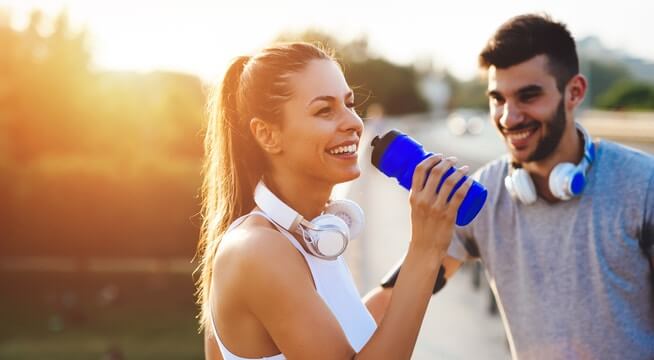
If you’re an athlete, you know that your hydration needs differ greatly from those of the average person. Routinely participating in vigorous or prolonged physical activity has many benefits (such as improved mood, more energy, better sleep, and greater overall health). However, hydration is just as important as the discipline necessary to excel in your sport of choice.
Whether you’re working on perfecting that breaststroke, hitting that goal pace, or increasing your speed while riding a bike, staying hydrated is an essential element for success.
The Importance of Hydration for Athletes
When you exercise, your body temperature increases. If not returned to its optimal level, this will interfere with performance. Water helps your body maintain its proper temperature, manage stress and regulate blood pressure. Finally, consuming the proper amount of fluids aids the body in transporting stored sources of energy, such as carbohydrates and other nutrients. In a nutshell, to perform your best, you need adequate hydration.
What Are Electrolytes?
Electrolytes are minerals that aid in muscle function and keeping your body hydrated. They include sodium, magnesium, phosphate, bicarbonate, and potassium, among others. They are essential to regulate the body’s pH levels and metabolism. When you sweat, you lose water and electrolytes. Therefore, if you’re exercising for an extended period of time, plan ahead to replenish both elements. If you exercise in extreme heat, you need to increase water and electrolyte consumption.
When the body has an electrolyte imbalance, a patient will experience dehydration, vomiting, and/or diarrhea. If the imbalance is severe, symptoms can include irregular heartbeat, muscle cramping, headache, numbness or tingling of the limbs and/or seizures.
When to Start Hydrating
Proper hydration starts well before you begin exercising. This is because when you start to sweat, your body is losing electrolytes.
How much water should an athlete drink?
How much water to drink depends on many factors, such as a person’s height, weight, gender, length of workout, perspiration rate, outside temperature, and environment humidity.
The American Council of Exercise (ACE) recommends the following guidelines:
- 17 to 20 ounces of water two hours before exercise
- 7 to 10 ounces of fluid every 10 to 20 minutes during exercise
- 14 to 24 ounces for every pound of body weight lost after exercise
What about sports drinks?
If you’re exercising for an hour or less, water will suffice. There’s no need to add additional sugars and calories. However, if your training program requires that you hit the pool, court, field, or the pavement for longer than an hour, sports drinks provide electrolytes that will help reduce the stress on your body and help you to perform at your best. That said, make sure to pay attention to the serving size. A single bottle can contain several servings.
Signs of Dehydration
Symptoms of dehydration include the following:
Complications of Dehydration
Complications of dehydration include a rapid heartbeat, low blood pressure, seizures, loss of consciousness, and heat stroke. If you’re experiencing any of the symptoms listed above, seek medical attention immediately.
When to See a Doctor for Dehydration
Seek medical attention if you feel symptoms of dehydration. If you’re in the middle of a race, get off the course and call a friend or family member from a medical tent. It’s important to keep in mind that many of the symptoms of dehydration are similar to hyponatremia (overhydration). This occurs when drinking too much water dilutes the amount of sodium in the body. In the most extreme cases, the condition can be fatal.
24-Hour Emergency Room Services in Colorado Springs and Texas
If you think you are experiencing dehydration, we can provide the care you need. If you have questions or need immediate treatment, your nearest Complete Care location is ready to help, no matter the time of day or night. We offer a variety of services to help you and your family in your time of need. No appointments are necessary.
Find the Complete Care location nearest you.
